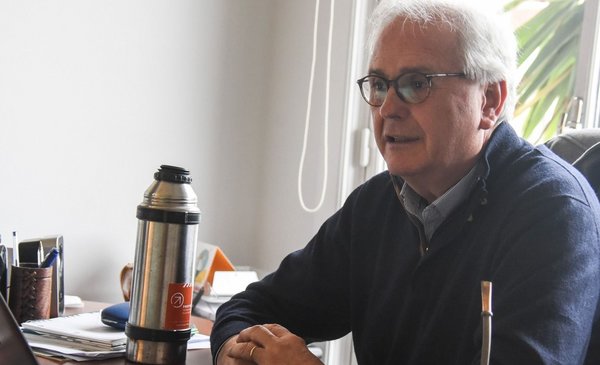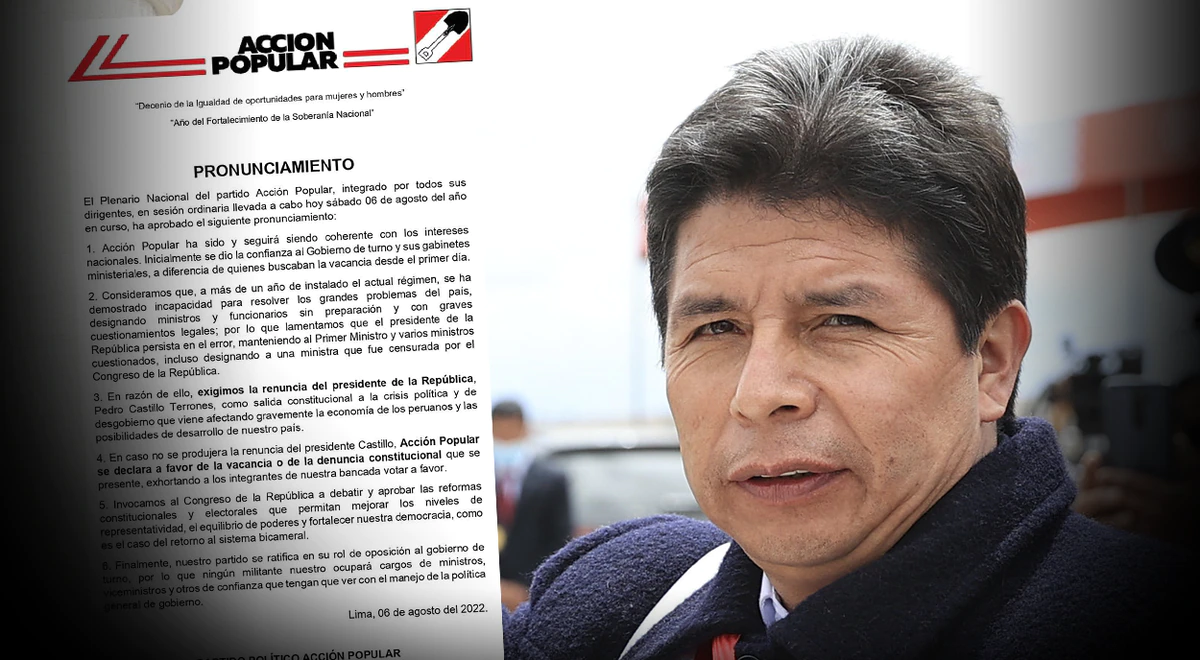He never leaves his notebook and consults articles or documents on it several times while chatting. Rudolph Saldain was responsible for heading the Commission of Experts on Social Security to which the government asked for recommendations to address a pension reform. He was president of the Banco de Previsión Social during the administration of Luis Alberto Lacalle Herrera. Despite this, he admitted that he only met his son, President Luis Lacalle Pou, in 2019. Later he saw him again when the commission began to function and he was in charge of giving him bad news: to correctly reform the system, he had to Raise the age required to retire. “Clearly it’s not nice, but it’s fair,” he told The Observer. He recalled that so far in the 60th century, countries have raised the age required to leave the activity. One of the points that he highlighted in the pension reform bill was the creation of a solidarity supplement that will replace the minimum retirement and will benefit others of up to $52,000. This supplement will generate a plus at the time of withdrawal and payment of the benefit. As stated in the articles of the preliminary draft, the administration of the established solidarity supplement will be in charge of the Social Welfare Bank and the resulting disbursements will be covered by taxes assigned to said autonomous entity or, if necessary, the financial assistance of the State.
Saldain added that despite the proposed improvements, the Social Security Bank will continue to have a deficit, but he clarified that if no action is taken, this deficit will increase.
Here is a summary of the interview with Saldain:
President Lacalle Pou acknowledged days ago that he could not fulfill the 2019 electoral promise of not changing the retirement age. He mentioned that after having one of the first meetings with the Committee of Experts on Social Security, he was told that this was impossible. What was it that was transmitted to him so that he understood that it was not possible?
2019 was a year of great uncertainty for those of us who were working on the pension issue. What we saw published on the page of the Banco de Previsión Social, in its medium, short and long-term projections, marked a certain downward trend in the level of spending until 2035 or 2040, approximately. Those weeks a job by a consultant was published that said the same thing. At that time I was starting a consultancy with Ceres and the then executive director told me that he was going to have an interview with the president of the BPS, Heber Galli. A meeting to ask the official version about some trends. There I pointed out to him that a crucial point was to know where we stood in terms of spending. I clarified that the available evidence indicated that this would not be as the projections said. There was a bank paper on spending on retirement (without pensions) that indicated that spending in 2018 was somewhat higher than that projected for 2055. I added that the trajectory that emerges from the work is consistent with the concern shown by the Ministry of Economy in the last rendering of accounts. He told me that the gap between projected work and actual spending was indeed disconcerting. Later, an economist who worked with Ceres told me that they had met with Galli and that the proposals about the projections had been dismissed. The one there was was a 2013 base projection. That in 2019 must be reviewed. Surely it was well done, the problem is in the assumptions. If the assumptions do not match what is happening, they must be revised. The problem is basically not that it was wrong, the issue is that there is no rule that says how they should be done. That is one of the tasks that we are giving to the Social Security Regulatory Agency (in the preliminary draft of the reform). Set the parameters and review every two years. Obviously, if there is a capable catastrophic event, it has to be sooner. In March 2020, the Social Security Bank published a new projection that accounted for the change in trend. One of the first things I did when the commission of experts began to work was to ask the president for an interview to speak. There I told him that there was bad news and that he was not going to be able to comply. There he had several options. On the one hand rewind and do nothing. What I received (from Lacalle Pou) was to make the greatest effort with a transition as long as possible and to contemplate in the best way what had been his point of view.
For many years there has been talk of the need to reform the social security system. Taking that into account, don’t you think it took too long to get into the subject?
It’s something we all know we have to do. So far this century there have been more than 60 countries in the world that have made pension reforms. Sweden, Spain, Finland, Germany, United States. It is a necessary reform. What advantage does it have to be now? That now it is possible with this graduation that we are proposing. In a few days we are going to see that the Caja de Profesionales is going to raise a very complicated issue and to the extent that decision-making is delayed, it becomes an issue in which you run out of instruments. In 2008, in the Caja Bancaria crisis, the bailout included more taxes and a reduction in pensions. Making a reform today we ensure that none of this will happen with the general regime. You can make a transition with 20 years. The bitter pill, the stone in the shoe – that’s what I called it at the meeting that Lacalle Pou called for all the parliamentarians of the coalition to present the bill – is the change in the retirement age. What we are proposing implies a very slow adjustment and with a few exceptions that are very relevant. We all know that the reform must be done. There is a general consensus. I think that the fact that there is a government that has the necessary political vigor to take the initiative in the middle of a term, shows that there is an opportunity to be able to achieve a great agreement.
Beyond being halfway through his term, next year the electoral campaign for the next elections will begin. Are you worried that the parliamentary discussion will drag on, continue at that moment, and everything will become more electoral political?
The parliamentary discussion should not go beyond the first months of next year. I believe that we must try to reach the maximum parliamentary agreements. For the 1995 reform, the project was presented in April and voted on in September. There was a strong agreement between (Julio María Sanguinetti and (Alberto) Volonté. The Broad Front did not vote for her, but Rafael Michelini, who at that time was outside the Broad Front, did. (Danilo) Astori also always agreed. I don’t think the The Broad Front is going to vote divided now The ideal would be that this could reach an agreement and that it come out with votes from all the parties, but it is a political scenario that is very difficult to achieve.
Camilo dos Santos
Rudolph Saldain
One of the aspects raised by the reform is the change in the basic retirement salary. What is the reason for that modification?
Today we have a lot of regimes. We are going to have a kind of 20-year convergence engine between now and 2043. It starts in 2027, to arrive at a common pension system. How do you liquidate the BPS now? It takes the last 10 years and compares them to the top 20. The Armed Forces Retirement and Pension Service? Depends. Those who are in the previous regime, who are half of the troops, with the last salary with some bonuses. Those of the new regime with the last five years. The Police Box the same. The Caja Bancaria like the BPS. The Caja Notarial with the 30 best years. The Caja de Profesionales with the last three years. It is an absolute heterogeneity that has no foundation. We propose to go to a common regime with the 25 best years. With exceptions. In the case of women, as part of the gender aspects contained in the draft, it can be 20 years and not 25 if that harms her average, because in the maternity environment she may have had a lower salary. or less hourly load. Then there are periods when the mother does not work as much as she could. That was the idea of taking the 25 best years and ending the heterogeneity. How fair is it to take a small period at the end? It’s not fair at all. Because the solidarity of that person has been throughout her life. The final period in an unskilled worker is practically the same, but in a public official, who has a rising career, it is something else. The 25 years are adjusted by the Average Salary Index (IMS) with one exception: the Caja Notarial adjusts by law through the Consumer Price Index (CPI).
What changes proposed in the preliminary draft of the reform stand out in the Caja Militar?
One refers to the 2018 law that established a service bonus at the rate of six years for five (one year of bonus for every five years of service) for all troops. We propose that the bonus applies to the military itself. But not for support services, basically Military Health. We see no difference between an ASSE dentist and a military health doctor. It’s different if he goes on peacekeeping missions. There he can have a bonus for that period. Another particularity is that a special benefit is incorporated, both in police and military, for deceased in acts of service. We believe that if they die in this way, their beneficiaries should have a different treatment. The same if he becomes disabled in acts of service.
Can the cash deficit be lowered with the planned changes? Does it stop being deficient?
No. It will not stop being deficient. None is going to stop being in deficit, not even the BPS, the Police Fund and the Military Fund, which are the organizations that have a fiscal impact. What will happen to the deficit? He was on his way to 5 points of the Gross Domestic Product (GDP). With the reform we stabilized it at 1.5 points of GDP (in 2069). An economist told me: then the deficit remains. That is unavoidable. This system is going to have a deficit because it has very strong solidarity components that do not depend on contributions. But there is also the change in retirement age. Without that change, none of this is possible and we are going to a deficit of 5 points of GDP. Is it particularly unfair to raise the retirement age when we have gained a very strong life expectancy from a long time ago? I think not. He’s clearly not nice. In April it was the run-off in France between (Emmanuel) Macron and (Marine) Le Pen. She said that raising the retirement age to 65 was a huge injustice and she tried to exploit that vein. At 65 years of age, the life expectancy ahead, due to current conditions, is an average of 25 years. We contribute a minimum of 30. Uruguay is at 17 years of healthy life expectancy.
It has stood out within the preliminary draft of the reform to the solidarity supplement. How would it work?
An absolutely central change is the solidarity supplement. It is within the new rights. It is a substitute for the minimum pension, and supplements pensions up to $52,000. According to the technical services, it will reach half of the registrations (to the pension system) when it is fully operational. For example, a person with a current retirement calculation of $13,500 for the minimum retirement regime receives $15,750. With the solidarity supplement foreseen in the reform, he will charge $22,100.
There is a chapter that foresees pension savings that arise from the bipartite negotiation. How would it work?
They are varied contributions. Above the normal contributions, it is to improve the amount of the benefits with liquidity options much larger than the common ones. It is important that there is such an instrument in collective bargaining. The worker who does not want the contribution will have the opportunity to leave. The employer will contribute for the worker who wants to do so. What he gives is a legal framework and it is bipartite collective bargaining, the government does not vote. We understand that it is not possible to force companies that do not agree to have a higher salary cost. That is deductible for IRAE in companies and in personal income tax for workers. There is a lot of international experience in this regard.







